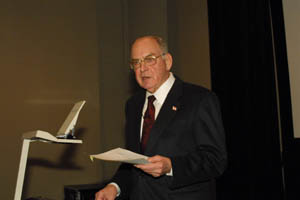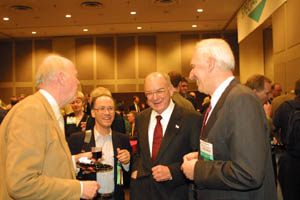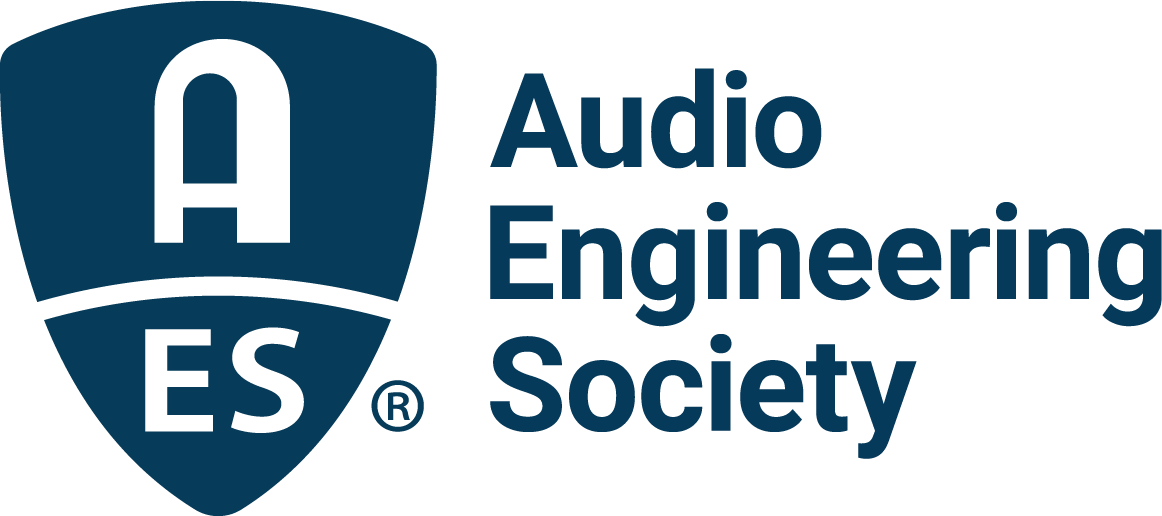Sunday, December 2, 5:30pm


Manfred Schroeder delivering Heyser Lecture at AES 111th Convention in New York and enjoying the reception after the lecture with friends.
The Unreasonable Effectiveness of Mathematics in Audio
Manfred Schroeder
University of Goettingen, Germany
Mathematics has had an almost uncanny impact on audio. From the abundance of applications of various branches of mathematics on audio engineering and music, I will focus on the following topics:
- Maximum-length sequences for the precision measurement of impulse and frequency responses of recording studios, concert halls, and all manner of audio components.
- The realization of efficient sound scattering by means of quadratic-residue diffusors and other number-theoretic phase gratings.
- Error correcting codes for compact discs.
- The measurement of reverberation times and sound decay rates by reverse integration.
- The statistics of reverberant sound fields in acoustics spaces.
I will also touch on the potential of the famous Fibonacci numbers, the related “rabbit” sequence and other self-similar number sequences for composing pleasing music and generating exciting rhythms.
Manfred Schroeder bio
Manfred Schroeder studied mathematics and physics at the University of Göttingen in Germany. In his thesis he investigated the distribution of resonances in concert halls using microwave cavities as models. The chaotic distribution he found is now recognized as characteristic for complex (non-integrable) dynamical systems.
In 1954 Schroeder joined the research department of AT&T Bell Laboratories in Murray Hill, New Jersey. From 1958 to 1969 he directed research at Bell on speech compression, synthesis, and recognition. Since 1969 he has also served as a Professor of Physics at Göttingen, commuting between the University and Bell. Since 1991 he has been University Professor Emeritus.
Schroeder is also a founding member of the Institut de Recherche et Coordination Acoustique/Musique of the Centre Pompidou in Paris. In the late 1950s he helped to formulate the U.S. standards for stereophonic broadcasting, now used worldwide. Schroeder holds 45 U.S. Patents in speech and signal processing and other fields.
Schroeder has written three books: Number Theory in Science and Communication; Fractals Chaos, Power Laws: Minutes from an Infinite Paradise; and Computer Speech: Recognition, Compression, Synthesis.
In 1991 Schroeder was awarded the Gold Medal of the Acoustical Society of America for “theoretical and practical contributions to human communication through innovative application of mathematics.” He also received the Rayleigh Medal of the British Institute of Acoustics, the Helmholtz Medal of the German Acoustical Society, and the Gold Medal of the Audio Engineering Society.
Schroeder is a Fellow of the American Academy of Arts and Sciences and the New York Academy of Sciences. He is also a member of the National Academy of Engineering in Washington and the Göttingen Academy of Sciences.
Schroeder’s hobbies are languages, bicycling, down-hill skiing, and computer graphics.

